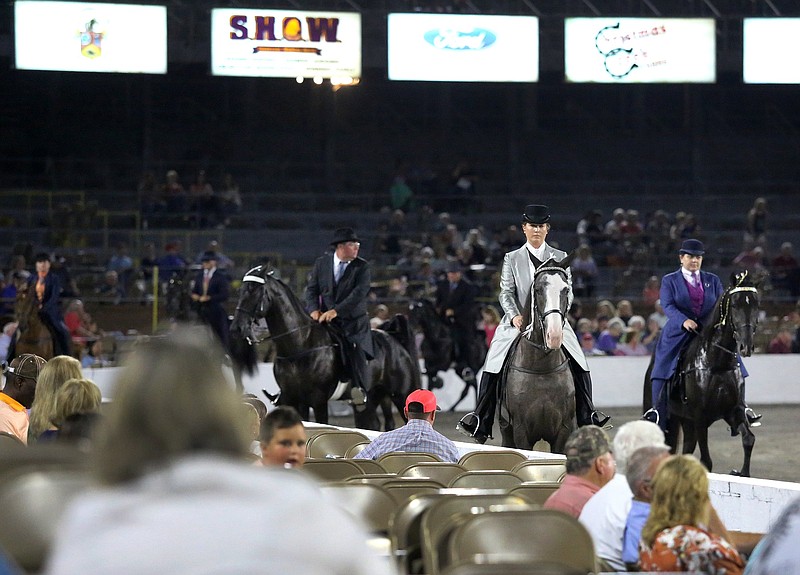It's walking horse time in Tennessee. Better put, it's save the horses time in Tennessee.
Those words, a take-off on the legendary and late John Ward's opener to Tennessee football games, once was another welcome to Tennessee and southern tradition - the 10-day Tennessee Walking Horse National Celebration that commences in the last weeks of August and ends around Labor Day.
But in recent decades, as the hoof "pads" grew taller and heavier on the front feet of our beautiful and gentle Tennessee walking horses and training shortcuts became more gruesome, the public image of Tennessee walking horses took a dark turn.
Most of America was introduced to the walking horse abuse in 2012 when undercover video aired on prime-time television offering a glimpse into the barns and training methods, known as "soring," of former Hall of Fame trainer Jackie McConnell. The video resulted in McConnell's and others' eventual guilty pleas and federal conviction in Chattanooga and Nashville courtrooms.
Soring is pain-treating a walking horse's front hooves and legs with burning chemicals and objects hidden beneath and around the heavy pads. With the increasing use of those immoral training methods, the graceful rocking gait of Tennessee walking horses became the uneasy lurch of the "big lick." But the big lick is simply an indicator that the horses' feet or legs are so painful that the animals try to make unnaturally high reaches to avoid putting their sore hooves on the ground.
The industry claimed McConnell was just one of a few "bad apples". But later that year, despite an industry claim that it had cleaned up its act, USDA inspectors reported that federal testing in the final days of Shelbyville's Celebration revealed 145 horses out of 190 - 76% - tested positive for the prohibited foreign substances used in soring.
This year, for the sixth consecutive year, a group of horse lovers calling themselves the Citizens Campaign Against "Big Lick" Animal Cruelty is peacefully assembling and protesting the Celebration. And they are putting yet another spin on John Ward's iconic Volunteer State pronouncement. They say: "It's boycott time in Tennessee."
The group, organized by Clant Seay, who raised Tennessee Walking Horse World Grand Champions and contenders from 1981 to 2005, is making headway not just by boycotting the Celebration, but also other smaller shows around the country. With their doggedness, they keep making the public aware that flat-shod walking horses are, all by themselves, a better show than abused big lickers.
They recently brought a spotlight to the Lions Clubs of America by boycotting the Woodbury Tennessee Lion's Club fundraiser, which featured 24 classes of "Big Lick" horses. The show's judge and official farrier both had previously pleaded guilty and been sentenced on horse soring charges.
The boycotters and their public awareness campaign, in fact, are doing more to protect horses than our Congress does, but we'll get to our lawmakers later.
Here's a gauge of what that public awareness has meant.
Some 20 years ago, 30,000 people attended the final Saturday night of the Tennessee Walking Horse National Celebration in Shelbyville. In 2019, fewer than 25,000 people attended the entire 10-day event.
And in 2000, the breed registry of the Tennessee Walking Horse Breeders' and Exhibitors' Association had just over 22,000 members. In 2020, TWHBEA could boast only 2,450 members - a decline of almost 90%.
Soring was first outlawed by the Horse Protection Act's passage in the 1970s, but it's an open secret that the law has loopholes a herd of horses regularly run through.
That brings us to our Congress, which seems to have no problem with horse abuse.
Newer legislation, the Prevent All Soring Tactics Act, better known as the PAST Act, was first introduced in 2013 and had overwhelming lawmaker support. Support - but not votes.
For almost a decade, the bill, which would have done away entirely with the nearly 8-pound stack shoes and chains, as well as the chemicals used to make the horses flail their hooves, was reintroduced over and over, only to be repeatedly held up in committees, thanks to the opposition of the Tennessee and Kentucky horse industry and our lawmakers.
In 2019, the PAST Act did finally pass the House of Representatives by 333-96. (Of course, almost all of Tennessee's, Georgia's and Alabama's Republican representatives voted no - including Chuck Fleischmann. Democrats voted yes.) But to this day, the measure continues to be held hostage in the Senate, kept from a vote by Tennessee's Lamar Alexander and later by Tennessee's Marsha Blackburn and by Senate Majority Leader Mitch McConnell of Kentucky.
In June, the PAST Act was reintroduced again, but languishes.
Marty Irby, a former TWHBEA president and self-described reformed sorer now is Animal Wellness Action's chief lobbyist. He says he fears the PAST Act is dead and will never pass. The key to reform, he thinks, is changing people's attitudes about what is more entertaining - a lurching sored horse or a graceful flat-shod walker going through its natural smooth gaits.
This brings us back to the tireless protesters with their signs and petitions in Shebyville. Look them up at billygoboy.com. They have plenty of protest signs you can hold and petitions you can sign.
